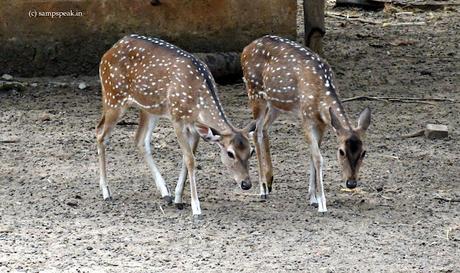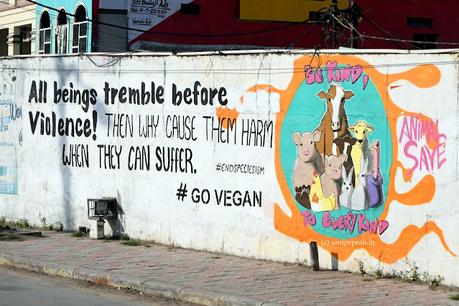Human mind, conditioning ! – perception .. .. almost all of us would see Deer as gentle, beautiful and weak creature of Nature. While we would grieve for a deer getting killed by a wild animal, tens of thousands of goats, sheep would get killed. While some would feed Pigeons / Parrots – not many would feed Crows !

Ever heard of “Speciesism” - An influential idea in animal ethics is that moral favouritism towards members of one’s own species is a prejudice. This prejudice has been labelled ‘speciesism’, in analogy with racism and sexism. “The question is not, Can they reason?, nor, Can they talk? but, Can they suffer?” Given that animals can suffer, does humans have a moral obligation to minimize or avoid causing such suffering, just as they have an obligation to minimize or avoid causing the suffering of other humans.
Few months back, the ABC aired a story showing footage of pigs in Australian abattoirs being stunned with carbon dioxide before having their throats cut. Packed into small, gas-filled chambers, these animals could be viewed writhing, gasping and screaming in distress, some foaming at the mouth. The pigs’ suffering was not an aberration; it is what countless pigs around the world commonly endure before being turned into ham and bacon. Such media exposés reveal how far we have – and have not – come since Australian philosopher Peter Singer published the seminal book Animal Liberation nearly 50 years ago.
In the world in which we live, there is much discrimination, of many different types. Speciesism is a form of discrimination. Discrimination occurs when someone is given less moral consideration than others or treated worse for an unjustified reason. Speciesism is a form of discrimination against those who don’t belong to a certain species. In most human societies, it is considered completely normal to discriminate against animals of other species. The ways this discrimination occurs and its severity differ from place to place, and certain animals are treated worse in some places than others. For example, dogs, cows, and dolphins are regarded very differently in some societies than in others. One thing most societies have in common is that they discriminate in some very harmful ways against at least some species of animals.

On the walls somewhere in Hyderabad
Speciesism is so commonplace that most people don’t think to question it except in cases where the type or degree of discrimination is unusual in their culture. As a result, humans exploit nonhuman animals in the course of everyday life, using them as resources. This happens in a variety of ways. Nonhuman animals are consumed as food, used for clothing, tormented and killed for entertainment, exploited for work, and raised and killed so their body parts can be used as raw materials in cosmetics and other consumer products. They are, essentially, slaves or even worse.
The origins of speciesism are lost in the mists of time. Humankind has clearly eaten and exploited other animals ever since our species evolved. Some other primate species today are predominantly vegetarian but all tend behaviorally to distinguish between their own species and others. No scientist has yet been able to test other species for the presence or otherwise of speciesist beliefs. Yet the common experience of close relationships between members of different domesticated species, and between humans and their pets, suggests that strong bonds of affection frequently occur across the species boundary. Even in the wild, dolphins have been recorded as protecting humans from shark attacks and sometimes adults of one species may foster the young of another species, and such adoptees sometimes grow up to behave as if they considered themselves members of their adoptive species.
The Australian philosopher Peter Singer and the American philosopher Tom Regan deserve special mention, not just because their work has been influential but because they represent two major currents of philosophical thought regarding the moral rights of animals. Singer, whose book Animal Liberation (1975) is considered one of the movement’s foundational documents, argues that the interests of humans and the interests of animals should be given equal consideration. A utilitarian, Singer holds that actions are morally right to the extent that they maximize pleasure or minimize pain; the key consideration is whether an animal is sentient and can therefore suffer pain or experience pleasure.
Peter Albert David Singer is an Australian moral philosopher and Professor of Bioethics at Princeton University. He specialises in applied ethics, approaching the subject from a secular, utilitarian perspective. He wrote the book Animal Liberation (1975), in which he argues for vegetarianism, and the essay "Famine, Affluence, and Morality", which favours donating to help the global poor. On two occasions, Singer served as chair of the philosophy department at Monash University, where he founded its Centre for Human Bioethics. In 1996 he stood unsuccessfully as a Greens candidate for the Australian Senate. In 2004 Singer was recognised as the Australian Humanist of the Year by the Council of Australian Humanist Societies. In 2005, The Sydney Morning Herald placed him among Australia's ten most influential public intellectuals.
You may not practice Veganism but most likely would agree with the thoughts of Singer and others in Speciesism !!With regards – S Sampathkumar
3.12.2023

